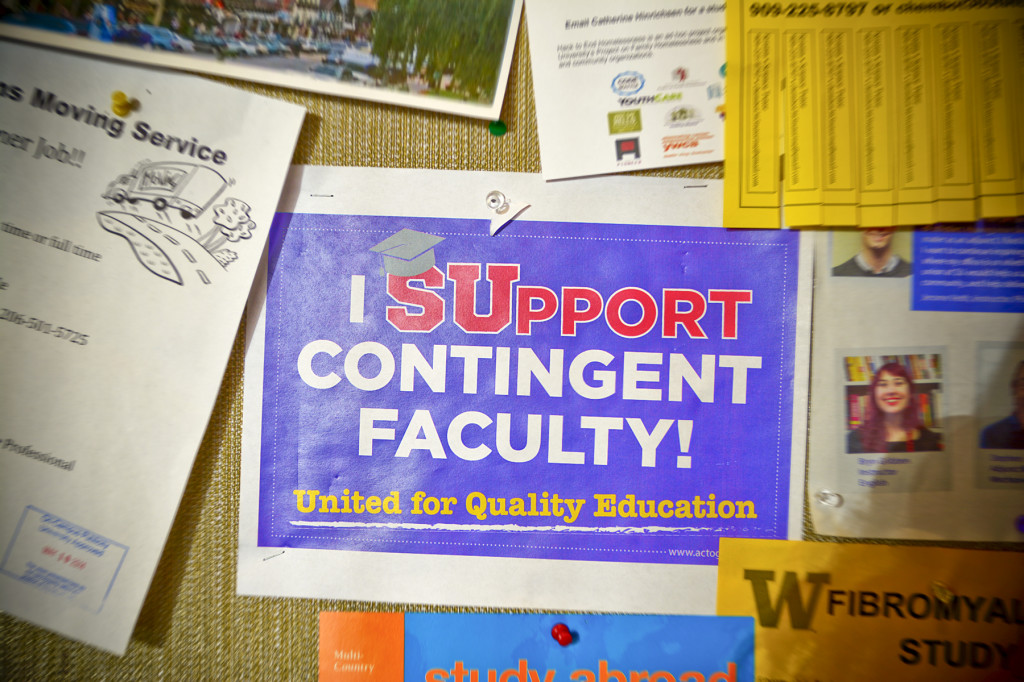The verdict is out: On Friday, April 25, The National Labor Relations Board (NLRB) ruled that Seattle University full-time and part-time non-tenure-track faculty are eligible to unionize with the Service Employees International Union (SEIU) Local 925.
Last week Ronald Hooks, Seattle’s regional director of the NLRB, determined that Seattle U “lacks substantial religious character,” a direct refutation of Administration’s claims of religious exemption. Hooks defended his decision by citing that the university receives no funding from the Catholic Church or Society of Jesus. He also acknowledged that the minority of its students are Catholic and the non-existence of religious requirements for faculty.
The University has until May 1 to appeal the verdict. Ballots will be mailed in mid-May to eligible Seattle U faculty votes to determine whether or not continue faculty at this school will unionize.

Signs in support of the unionization of adjunct faculty have been appearing around campus bulletin boards. Members of Act Together Washington have also been handing them out in front of Seattle University buildings.
In an April 28 email obtained by The Spectator and addressed to Seattle U faculty, Provost Isiaah Crawford argued that the testing utilized by the NLRB is inherently inappropriate. He claimed that government officials “probe” the university’s religious identity in nature and authenticity, itself a violation of Seattle U’s religious independence. He defended the institution’s adherence to the religious freedom of students and faculty by reaffirming the university’s policy not to enforce religious requirements on students stating that it “would not make us ‘more Catholic.’” He claimed Hooks’ verdict superficially understands faith-based institutions as those that “proselytize.”
Rich Nafziger, full-time associate economics professor and a former Research Director for SEIU in Washington D.C. would disagree with Crawford, stating that, “I think unionism is Catholicism.”
The proposed union’s structure did not include the schools of law and nursing given the relatively unique nature of their internal staffing rotation compared to the other six colleges on campus. University administration had heavily criticized this exclusion, arguing that it ignores the “shared mission, purpose and community of faculty,” in another attempt to block unionization efforts. The administration points out that were unionization to occur, the contingent faculty of the colleges of nursing and law would be governed by a separate mechanism from the other six colleges.
Hooks dismissed these arguments as deliberately undermining the unionization effort, determining that these schools should be held separately from the other colleges at the university due to their minority in the Academic Assembly and their having the most year-to-year contracts.
Hooks also rejected the administration’s argument that the proposed union’s inclusion of both full-time and part-time contingent faculty members is inaccurate because the administration considers full-time faculty members to be “managers.” This language distinction is designed to further complicate the structure of the proposed union.
One of the leaders in the unionization effort, Larry Cushnie, who teaches political science at Seattle U spoke to the verdict by saying, “We’re excited just to finally move forward. We’re happy that the process re-confirmed what we said all along. It’s unfortunate that it took as long as it did to get to the end of this […] But we’re excited to move forward to the election and give contingent faculty an opportunity to make decisions for their own fate here at the university.”
Seattle U has until May 1 to appeal Hooks’ decision. The future of Seattle U’s contingent faculty is likely to echo the fate of those at Pacific Lutheran University (PLU) who addressed their contingent faculty dissatisfaction in June of last year. Hooks also ruled on this case, denying the religious exemption that PLU administration cited.
PLU contingents held an election in September of 2013 to determine their affiliation with SEIU Local 925. But before the votes could be counted, university administration appealed the election to the NLRB, again arguing the validity of federal jurisdiction over PLU as a religious institution.
The ballots were subsequently impounded by the NLRB’s Washington, D.C. office. In February, the NLRB invited the filing of amicus briefs.
Seattle U’s adjunct and contingent faculty’s unionization efforts began in January of this year when they initiated contact with SEIU Local 925. Their objectives: employment stability, contract transparency and a living wage.
Unionization was debated extensively in a series of hearings held before the NLRB, where University President Fr. Stephen Sundborg, S.J., Provost Crawford and members of both tenured and non-tenured faculty were questioned by SEIU and Seattle U attorneys. The hearings delved deeply into Seattle’s U’s religious nature and attempted to determine what constitutes a pervasively Jesuit institution. The discourse continued for several months.








